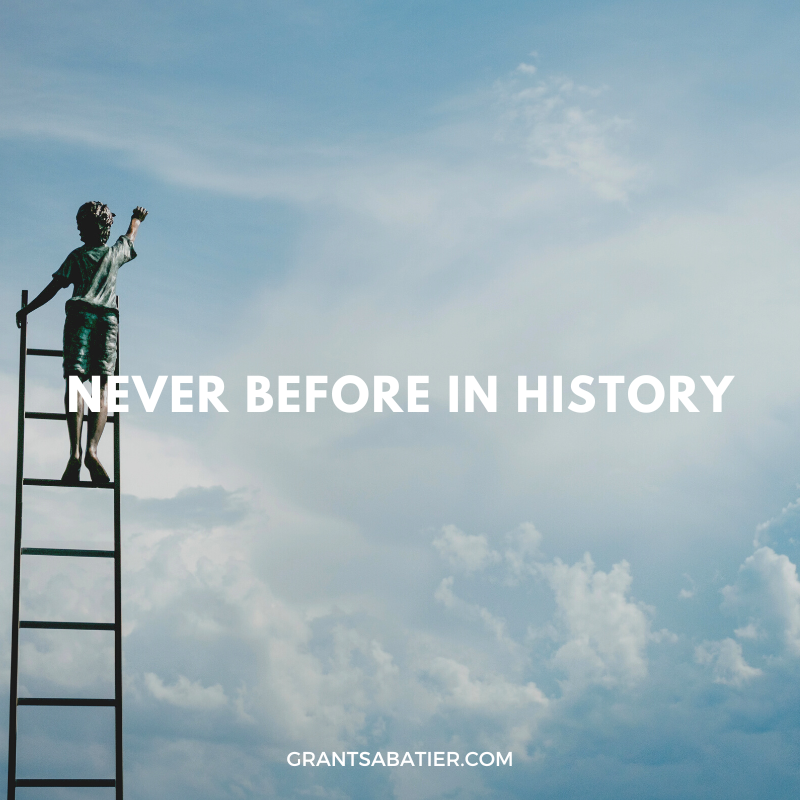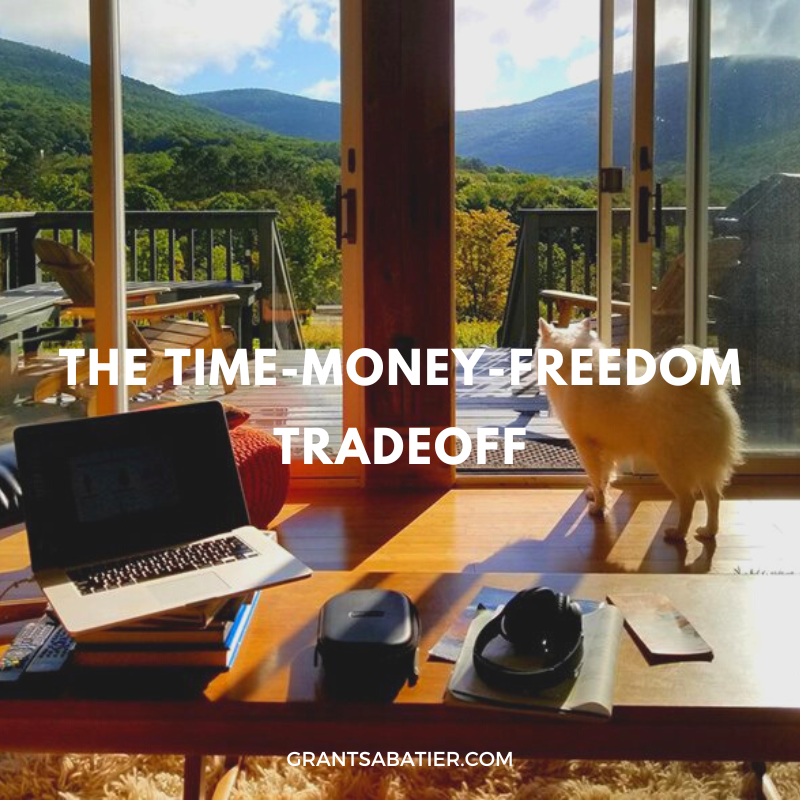It’s been exactly 5 years since I reached financial independence. I want to share 15 lessons that would have made my own FI journey more effective, efficient, and enjoyable.
I also think they’ll be useful in preparing for an increasingly uncertain future.
1. Making more money is more important than cutting back more
While both sides of the coin matter, there’s a limit to how much you can cut back, but not a limit to how much you can make.
Spend more time finding ways to make more money than looking for ways to save it. While both will help you reach financial independence, making more money so you can invest more money is an X factor and will accelerate compounding.
2. Do the “Life Work” first
Think hard about why you want more money. I thought I wanted a lot of money, but what I really wanted was more time, space, options, and freedom in my life. While money can buy you those things, you don’t need tons of money to have them. I could have gotten all of those things, and in fact, I had most of those things long before I reached financial independence. None of the freedom matters if you don’t use it.
When I started my financial independence journey at 24 my only goal was to “save a million dollars.” I was thinking about money, not life. Think about what you want your life to look like and then figure out how much that lifestyle costs. Figure out what actually makes you happy and realize that it might change as you change. Focus on quality of life today, not just financial independence in the future. Most of the things that make me happiest in life are inexpensive or even free (it took me a long time to figure this out).
3. Live your own life
As much as I love my partner, she was never into my pursuit of financial independence. No matter how excited I got about making, saving, and investing money, she just wasn’t into it. It’s not that she wasn’t supportive, she just had no interest in talking about money, house hacking, or any of it. I’m cool with that and we both respect that we have different interests.
Now that we’re FI she could care less. She loves her job and has no plan to ever “retire”. As I’ve mentioned before, my biggest challenge while pursuing financial independence wasn’t the tactics, it was choosing to live differently than my family, friends, and even partner. While it’s likely easier to pursue FI with your partner, it’s totally possible to achieve it solo, as long as your partner respects your pursuit. One quick tip to try to get them onboard – focus on how money can help you achieve your life goals together. Lead with life, then talk money.
4. Find your limits
Growing up we were often told and believed we could do anything. We can’t. While we’re certainly capable of a lot, we can’t do or be everything. We all have limits in our lives. Limits aren’t about inadequacies, they’re about self-awareness. Knowing your limits is about deciding what tradeoffs you’re willing to make.
For example, I’ll never be a billionaire. Why? Because I’m not willing to manage multiple businesses or work that hard. I also have no interest in becoming a billionaire and the responsibility that comes with it. The sooner you recognize your limits the more successful and happier you can become. Not everyone is meant to be an entrepreneur. Not everyone is meant to play in the NBA. Not everyone is meant to be a billionaire. But all deserve a life we love.
5. Find your weaknesses
When it comes to saving, making, and investing money, we’re often our own worst enemies. Our pre-historic brains simply aren’t well equipped to handle the increasingly complex variables and uncertainty at play in the global markets. I’m confident that in the near future we’ll have our own personal finance algorithms that will manage our financial lives way more efficiently and effectively than we can.
I’m not talking about robo-advisors or simple automation – I’m talking about complete financial optimization in our pocket. While the technology isn’t there yet, we’re getting closer. My guess is this will be ready in 5 years or less. Until then, figure out your own weakness. What triggers cause you to spend more money? What stupid decisions do you make over and over when it comes to money? Be honest with yourself and plug the gaps.
6. Focus on your strengths
This also comes back to self-awareness. We often spend our time trying to turn our weaknesses into strengths, instead of doubling down on our strengths. We all have weaknesses and we all have strengths.
While there’s always room for improvement, most people (myself included) spend too much time on their weaknesses and not enough time on their strengths. Once I realized I was good at selling, but terrible at managing people, I hired someone to manage people for me. Focus on what you’re good at and get even better. Fine-tuning your strengths is where you should be putting most of your effort.
7. Invest simply, early, and often
As someone way smarter than me once said, successful investing is about “Time in the market. Not timing the market.” This is true. Over 90% of my net worth has come from investment gains. Instead of waiting for the perfect time or perfect investment, get started, and keep at it.
Every time you buy stocks hold it for at least 2 years, don’t buy or sell stocks when the market is open, and put most of your money in a broad total stock market index fund. Don’t invest in anything you don’t understand. Focus on stocks, bonds, real estate, and building a business. These are the most historically reliable ways to build wealth.
8. Good is good enough
Don’t overthink it. The obvious answer is often obvious for a reason. I spent way too much time obsessing about every single money decision and about my net-worth. I would feel guilty for weeks if I made a stupid decision. I worried too much about the future. When you’re in full optimization mode it’s hard to have perspective. So much of being successful with money is about the simple execution of a strategy.
Once you’ve figured out the tactics just keep at it. You’re going to make mistakes. I made a ton of them. Everything you’re doing, both good or bad, compounds over time. As long as you’re doing “more good than bad,” the good decisions will win out in the end. Simply moving in the right direction and keeping at it is often good enough.
9. It takes time
Everything takes time. Most side hustles don’t start making money for 6-12 months. Most investments take years to start growing meaningfully. A lot of people simply give up too early. Often the most successful people are simply the last ones standing. This is why it’s a lot easier to keep going if you love your life and know why you’re making tradeoffs.
Also, just because it took me 5 years to reach financial independence, doesn’t mean that you should try to do it too. I wish I would have taken it slower and not made so many tradeoffs in my own life. Go at your own pace. Adapt. Focus on maximizing your happiness per dollar, both in how you spend and save money. To me, there’s no such thing as balance. Only the ebb and flow.
10. Money has diminishing returns
I’ve said this before, but the more money you make, save and have invested, the less that money matters in your life. As Kanye famously said, “Having money’s not everything. Not having it is.” Get the money part of your life taken care of and once you’ve got a good system and a good path, focus on life over money.
The more time you spend with money and the more honest you are with yourself about what makes you happy, the better your relationship with money will be.
11. Give yourself permission to do nothing
Set a time on your calendar each to do nothing. I recommend 3 or 4 hours. Go lay in a hammock. Lay under a tree (my personal favorite). Take a walk. Whatever. Just exist in the world.
I used to always try to fill every moment of my day with productive time and then I’d feel guilty when I wasn’t working or doing something productive. Schedule do-nothing time. This helped me immensely.
12. Health should be the priority, not the afterthought
I’ve always struggled with self-care. I’ve always struggled with balance. It’s just hard for me and like a lot of people in my 20’s I thought I was invincible. Working 80 hour weeks year in and year out isn’t good for anyone.
I was my own worst enemy. I should have been working smarter and I likely would have been way more effective if I rested.
13. Ask for help
When you have a question about money ask someone who knows. Don’t just search online. Pay someone for an hour of their time and expertise. This knowledge adds up and is often worth the investment. A good lawyer, CPA, and Relator are worth paying for. Even a financial advisor might be worth it, as long as you pay by the hour, and not based on assets under management.
14. Share everything you know
So much joy in my life has come from sharing what I’ve learned with others. Not only is it fulfilling to help others on their financial journey, but I also learn a lot from others too. Many readers or podcast listeners have turned me on to books and ideas and connected me with incredible people than I can count. Writing and sharing also help me organize my own thoughts and reflect on what did and didn’t work.
Whether starting a blog, a YouTube channel, a local meetup, or sharing on social media, sharing what you know is valuable on many levels. Not only can you connect with others who are on a similar journey, but you can also deepen your relationship with yourself. Oh, and you can also monetize your content once you build an audience – there’s that too As long as it feels authentic to you and you feel you’re adding value, share everything you know.
15. Don’t be afraid to let go. Recalibrate.
For me, the skills that helped me reach financial independence aren’t the same ones that have helped me cultivate a happier life over the past 5 years. Don’t be afraid to let go of who you think you are, or who you’ve been, so you can create space for the you you’ve yet to become.
Hands down the most successful and happiest people I’ve met are all good at one thing: embracing and adapting to change.
Bonus: Define success for yourself. This is a lot easier said than done. But to me success wasn’t about the money, it was about peace. It wasn’t about security, it was about growing. It also wasn’t about being happy all the time, but about feeling alive.
Grant Sabatier writes about money, mindfulness, and financial independence – all with the ultimate goal of helping you build a life you love.
His story and ideas have been featured in The New York Times, Washington Post, NPR, CNBC, Business Insider, and many other places.




